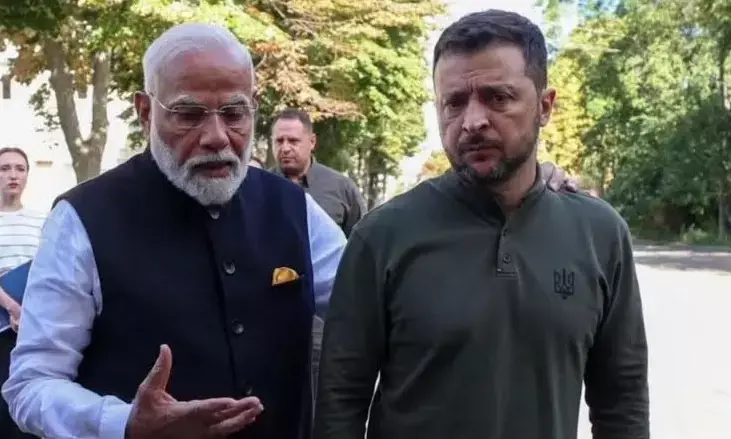Modi In Ukraine: Posturing Of Little Value
Peacemaking has been left to Ukraine and Russia

Indian Prime Minister Narendra Modi's visit to Ukraine on Friday was an exercise in posturing only to seem to be neutral between Russia and Ukraine without bringing any proposals or ideas to the table. The posturing did not amount to much given the fact Modi had neither brought a workable proposal to end the war nor was he in a position to influence any of the warring parties.
Zelenskiy was expecting Modi to bring a peace proposal, but Indian External Affairs Minister S. Jaishankar merely said that all matters relating to the conflict were discussed in the talks.
The Ukrainians would certainly have expected India to stop or reduce the import of oil from Russia, but Jaishankar ruled out any such possibility saying that India needed a lot of oil and that it was impossible to get it from other countries given the fact that many of the top suppliers were under sanctions.
Jaishankar took a swipe at the United States without naming it, when he said that India did not approve of sanctions. India had never imposed sanctions unless the United Nations sought them, he added.
However, Modi conveyed to Zelenskiy his profound distress over the war being fought on Ukrainian soil and assured him that he would personally do all he could to bring about peace.
“I want to assure you that India is ready to play an active role in any efforts towards peace. If I can play any role in this personally, I will do that. I want to assure you as a friend,” Modi said.
Modi said he had come to Kyiv with a message of peace and called for dialogue between Russia and Ukraine at the earliest opportunity. But he offered no peace proposal.
“The road to a resolution can only be found through dialogue and diplomacy. And we should move in that direction without wasting any time. Both sides should sit together to find a way out of this crisis,” the Indian PM said.
Asked to comment on China’s initiatives to solve the problem, External Affairs Minister S. Jaishankar chose not to comment saying that the question could be addressed to the parties concerned.
During Modi’s 6-hour visit to Kyiv, India and Ukraine signed four agreements, none of which was significant, having to do with soft areas like community development.
No agreement was signed on defence relations.
Modi got a lot of flak in the Western media on his visit to Moscow in July and his giving a bear hug to Putin on a day when the Russians had hit a target in Ukraine killing 41 civilians including children.
Zelenskiy had criticised Modi’s visit to Moscow describing the Modi-Putin meeting as a “huge disappointment and a devastating blow to peace efforts.”
Further, India had abstained from all UN resolutions critical of Russia’s actions since 2022, and its decision to disassociate itself from the outcome document at the Swiss Peace Conference in June was received with dismay in Kyiv.
It appears that Modi visited Ukraine to wash off these stains.
In response to the BBC correspondent’s critical remark about Modi’s hugging Putin in Moscow, Jaishankar said that in the part of the world Modi came from, people greeted each other with a hug, and added that Modi had hugged Zelenskiy too.
The US and Europe had followed Modi’s Ukraine visit keenly to see if he would compensate Zelenskiy in concrete terms. But there was nothing in the visit for them.
Jaishankar’s criticism of the American policy of sanctioning countries would have further confirmed the growing feeling in Washington that New Delhi is a shifty partner.
However, Washington-based South Asian expert Michael Kugelman told BBC: “It’s not surprising to see India balance its relations between two competing nations or blocs. The country’s famed non-alignment approach to geopolitics has served it well for decades.”
“By going to Kyiv, Modi is signalling that while India will continue to have strong relations with Russia, it will still work closely with the West.”
“India isn’t in the business of placating Western powers, or anyone for that matter. It’s a trip meant to advance Indian interests, by reasserting friendship with Kyiv and conveying its concerns about the continuing war.”



